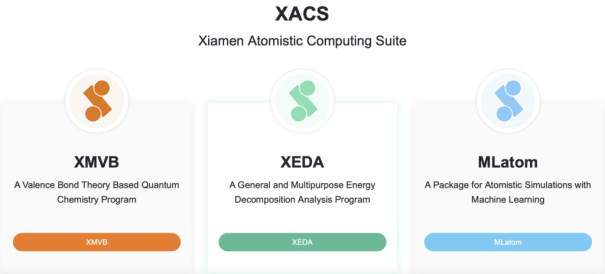MLatom joins Xiamen Atomistic Computing Suite

We are very happy to announce that MLatom joins Xiamen Atomistic Computing Suite (XACS) which allows us to provide much better service to the theoretical and computational chemistry community. We marked the inception of XACS by holding a local workshop in Xiamen, China on April 22-24, 2022 which we will extend to international audience. In the workshop, XACS founders, contributors, and partners gave theoretical lectures and practical tutorials about main packages in the suite.
What is XACS?
The mission behind the Xiamen Atomistic Computing Suite (XACS) is to provide theoretical and computational chemists with efficient, friendly and unique atomistic computing software packages for quantum chemical and artificial intelligence calculations of atomistic systems with the main development base at Xiamen University, China.
At present, XACS contains three core packages:
- XMVB – A Valence Bond Theory Based Quantum Chemistry Program
- XEDA – A General and Multipurpose Energy Decomposition Analysis Program
- MLatom – A Package for Atomistic Simulations with Machine Learning
XACS also provides other practical quantum chemical calculation tools.
XACS cloud computing services for our three core software packages can be used to perform online calculations with XACS packages without downloading and installing them. In order to promote research and software development in relevant fields around the world, we provide free XACS packages. Our cloud computing services are currently available for free mainly for demonstration and educational purposes. In addition, we will hold regular XACS workshops, where the users can learn relevant theories and obtain practical skills in performing computations.
For more information about XACS, please visit http://xacs.xmu.edu.cn.
The First XACS Workshop


The first Xiamen Atomistic Computing Suite (XACS) workshop was hosted by Fujian Provincial Key Laboratory of Theoretical and Computational Chemistry and held in Xiamen University on April 22-24, 2022. Due to the epidemic situation, the workshop was a hybrid online/offline domestic (i.e., held for participants in China) event with 132 online students and faculty from 55 universities in China and 32 students and faculty from Xiamen university attending the offline meeting.
The workshop was a three-day event with a combination of lectures and exercises. It taught the basic concepts of valence bond theory and energy decomposition analysis, as well as the basics of machine learning. It also introduced how to use the three core packages in XACS. During the workshop, lectures were given by XACS founders Prof. Wei Wu, Prof. Peifeng Su, Prof. Pavlo O. Dral from Xiamen University as well as by XACS partners Prof. Yirong Mo from North Carolina State University at Greensboro and Prof. Olexandr Isayev from Carnegie Mellon University who gave excellent lectures on “The Block-Localized Wavefunction Method and Its Application” and “Introduction to NN & ANI and Active learning: Theory”, respectively. Besides, teachers and teaching assistants communicated with online students through discussion groups on the Slack software and helped them to solve problems about software packages. All the calculations and practices were done through the newly launched XACS cloud computing platform. Finally, the workshop committee awarded completion certificates to those who had good performance in exercises completion and also selected several outstanding students.The Xiamen Atomistic Computing Suite (XACS) workshop provided researchers and students in the field of theoretical and computational chemistry a good opportunity to learn XMVB, XEDA and MLatom software packages. It also increased the participants’ interests in chemical bonding theory and machine learning.
[Exerpts from https://chem.xmu.edu.cn/en/info/1020/1960.htm]
To get the feeling of the workshop, here are some pictures (many taken by Prof. Peifeng Su):





Leave a Reply